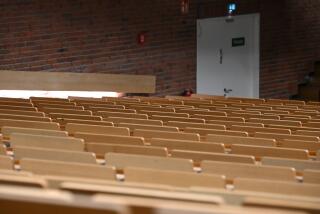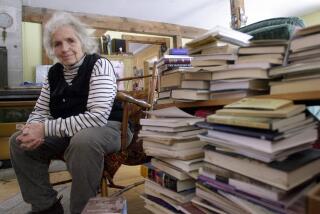Suspicion and Silence Jolt Self-Image of the Tolerant
- Share via
Kameron White is a reasonable and tolerant man. He prides himself on his open mind. While in college, he traveled throughout Europe and studied architecture in Italy and African art in Ghana. He came to Los Angeles from North Carolina to follow rock-star dreams and enjoy a world society.
“That’s what I like about the people here,” he said. “It’s international and diverse.”
But since the Sept. 11 attacks, the open mind White has worked so hard to cultivate has closed a little. Certainly, he is infuriated by attacks against Middle Eastern immigrants and Muslims. But in his heart, there is a new wariness.
He can’t help but wonder, for example, about his Iranian American co-worker: Is he Muslim? And there’s that Afghan American woman he likes who is a regular at the bar he frequents on Tuesday nights: “I know her, so I feel like I know who she is. But I don’t know her family, or the people who live back there. So I think, well, maybe she could down the line know somebody who is one of Osama’s little army or whatever.”
This is not the hot fury for revenge that leads to crimes of hate. This fear surprises normally tolerant, well intentioned people who never would have believed they would shrink from a passing Muslim or nearby Arab. But now, before they can stop themselves, they do.
Hate crimes against Muslims and people who may look Middle Eastern mount daily. But most Muslims are not assaulted by gun-toting stereotypes of race-baiting extremists. Instead, as they shop for groceries or stop for gas, at parks and at coffee shops, they are met with side glances and frozen silences.
Even something as innocuous as Arabic script can spark suspicion and fear.
“I was buying some bread at Gelson’s to bring to a dinner party and I wanted something a little unusual,” said a woman at a chic day spa who asked not to be identified. “So I’m browsing through the breads when I pick one up and I see it has Arab writing on the plastic.
“And I just dropped it, just like that.” Her head dropped and she raised a hand to her eyes. “I’m so disturbed that I would do that. It bothers me so much that I would have that feeling, that I didn’t just buy the bread.
“I live in an ethnically diverse neighborhood--Cathay Circle [in Los Angeles’ Mid-City area]--and that’s by choice. But I didn’t want people to see me buying Arab bread.”
She bought wine instead--and even that led to tension. At the party--a Rosh Hashana supper--another guest noticed something suspicious about the wine and read the label aloud. The label made a tongue-in-cheek reference to the Sonoma wine country, crediting “Sonoman archeologists” working in the desert. But it was enough for one of the other guests to teasingly suggest an Islamic connection.
“Everyone made a joke of how I’d bought this politically incorrect bottle of wine,” the woman said.
Katherine Tucker’s fears were a little more concrete, but only a little. A Chicago social worker, Tucker never thought much about religious and cultural differences--until Sept. 11.
Newly married, Tucker and her husband were in line at O’Hare International Airport for a honeymoon flight to Hawaii when she saw two “Middle Eastern-looking men” waiting in the same area.
“ ‘I hope they’re not getting on my flight.’ That’s what I thought, and that’s terrible,” she said. When she realized the men weren’t Middle Eastern after all, she “felt reassured, but also embarrassed.”
On a recent broadcast on Pasadena public radio station KPCC-FM, talk show host Larry Mantle, regarded as a paragon of evenhandedness, acknowledged he would feel the same way.
“I have to admit my mind would wander if I got on an airplane and saw some Arab American gentlemen on board,” he said during the show.
During an introspective off-the-air moment a couple of days later, Mantle said he is not particularly embarrassed about having such feelings, but added: “Ideally, I would wish I wouldn’t have that knee-jerk reaction. In an ideal world, I wouldn’t feel that way.”
The reason for this suspicion has less to do with the Sept. 11 attacks and more to do with historically shaped preconceptions, said Hussein Ibish, a spokesman for the American Arab Anti-Discrimination Committee in Washington, D.C.
“We live in a society where we tend to think of everything in ethnic terms unless the perpetrators are white,” Ibish said. “Timothy McVeigh bombed Oklahoma City, but people didn’t think of him as Irish. Or take [Theodore J.] Kaczynski, the Unabomber. Nobody thought of him as Polish.
“If you’re not white, ethnicity is the sole and primary category in these circumstances.”
Some are committed to purposefully restraining themselves when they feel a knee-jerk reaction.
Benjamin Eldredge, 24, an aspiring screenwriter, described his own struggle against prejudice as he sat cross-legged on the floor at the Bodhi Tree, a Melrose Avenue bookstore specializing in books on spiritual enlightenment.
He had been at a coffee shop recently, he said, when he noticed two “Middle Eastern-looking” men speaking what sounded like Arabic nearby.
He studied their dress, listened to the tenor and tone of their conversation, strained to catch a few words of English.
“Then I consciously pulled my attention away from them and back to myself and my book,” Eldredge said. He did not berate himself for his feelings and does not berate others. “Why did I stop to take notice? It’s fear. But I refuse to live in fear, and so I refocused my attention away from them and brought it back to me.”


